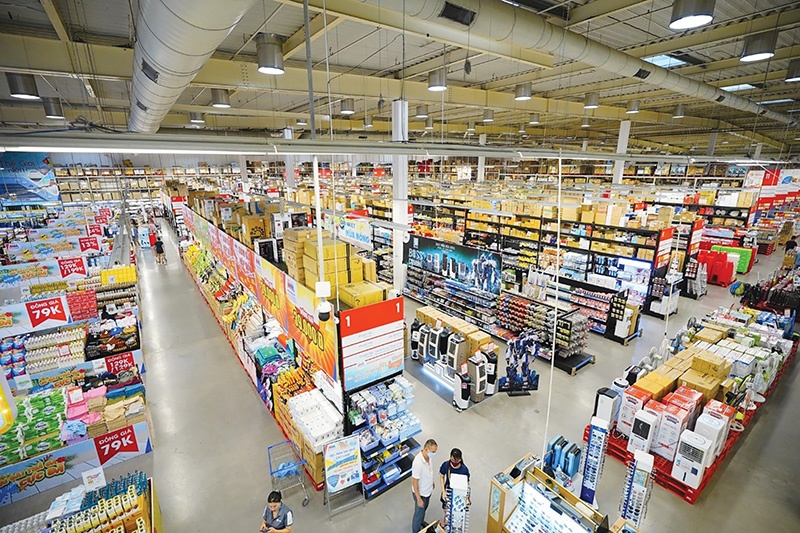Electronics traders bemoan bleak results
 |
| Electronics traders bemoan bleak results, Illustration photo |
While surfing on the websites of electronics shops in Vietnam, such as dienmayxanh.com, customers can currently buy products with a discount of up to 50 per cent on air fryers, blenders, and water purifiers. The remaining products are offered at discounts of between 10 and 40 per cent.
Nguyen Kim, operated by Thailand’s Central Group, also offers free delivery and instalment purchase programmes to attract customers, along with standard discounts.
On the websites of other electronics traders such as HC and Pico, competitive discounts and promotions have been offered to lure customers. However, in general, many of these appliances remain unsold despite the large promotions.
Nguyen Anh Tu, manager of a home appliance centre in Hanoi’s Cau Giay district, told VIR that since social distancing was applied in Hanoi sales have plummeted, especially in segments like air purifiers, washing machines, refrigerators, air conditioners, and televisions.
“Usually, issuing such deep discounts is considered a trump card to lure customers in during every shopping season. However at this time, the solution is no longer effective because people are forced to tighten their purchases as they need to spend their money on essentials like food,” Tu said.
Quang Duc, a marketing director at Pico, said that the situation started in May when the number of local infections rose dramatically. The biggest decline was seen in sales of televisions.
“Normally, revenues from sales amount to hundreds of billions of VND [several millions of US dollars] per month, and Hanoi is the largest distribution market. However, at present these figures can only reach a third of the usual sales. Our company also had to deal with transporting products within the inner-city areas, especially to stores and warehouses in other cities and provinces as electronics are not essential goods,” Duc said. “Along with the plunge in revenues, our company as well as others are suffering under the pressure of paying the rent for the retail space.”
According to Savills Hanoi, the average rental price for Hanoi’s retail market remains at $40-50 per square metre. Meanwhile, the average area of a larger electronics shop amounts to 1,000sq.m, leading to very high recurring costs.
In addition, the pandemic also prevents the expansion of electronics businesses. In July, Media Mart opened an additional seven stores in the northern provinces of Ha Giang, Ninh Binh, Yen Bai, and elsewhere. However, during August and September, no customer could reach these stores.
According to the report “Electronics and Appliance Specialist Retailers in Vietnam” by Euromonitor International, under the impact of the pandemic, electronics retailers registered a notably lower sales growth in 2020, with the average unit price dropping significantly.
Vietnamese consumers have become more cautious about their expenditures, especially on unnecessary products such as electronic appliances, because they are focused on ensuring sufficient supply of food and other essential products.
As data from the YouGov Brand Index suggested, Vietnamese consumers are likely to purchase electronic devices and home appliances from electronic retailers after the pandemic. May and June saw an increase in the purchase intent of these products within locals. However, the figure decreased in July and August as strict lockdowns prohibited people from receiving non-essential goods through delivery services. YouGov expects sales to pick up again after the current lockdowns.
YouGov Vietnam CEO Thue Quist Thomasen said, “Even though Vietnamese are used to purchasing almost everything through online platforms since the start of the pandemic, we believe that the story is slightly different for whitegoods and other electronic devices. For the majority of Vietnamese, these big-ticket purchases need careful consideration within the household. The ongoing lockdown has pushed many appliance retailers to scale down or fully close their shops. With this, they are also moving their business from physical stores to online platforms.”
Thomasen added, “This catch-22 situation is very inconvenient for consumers and retailers. Although times are hard, we know the resilience of the Vietnamese and believe businesses will quickly recover with proper planning and readiness for adjustments along the way.”
What the stars mean:
★ Poor ★ ★ Promising ★★★ Good ★★★★ Very good ★★★★★ Exceptional
Related Contents
Latest News
More News
- PM outlines new tasks for healthcare sector (February 25, 2026 | 16:00)
- Ho Chi Minh City launches plan for innovation and digital transformation (February 25, 2026 | 09:00)
- Vietnam sets ambitious dairy growth targets (February 24, 2026 | 18:00)
- Masan Consumer names new deputy CEO to drive foods and beverages growth (February 23, 2026 | 20:52)
- Myriad risks ahead, but ones Vietnam can confront (February 20, 2026 | 15:02)
- Vietnam making the leap into AI and semiconductors (February 20, 2026 | 09:37)
- Funding must be activated for semiconductor success (February 20, 2026 | 09:20)
- Resilience as new benchmark for smarter infrastructure (February 19, 2026 | 20:35)
- A golden time to shine within ASEAN (February 19, 2026 | 20:22)
- Vietnam’s pivotal year for advancing sustainability (February 19, 2026 | 08:44)

 Tag:
Tag:




















 Mobile Version
Mobile Version